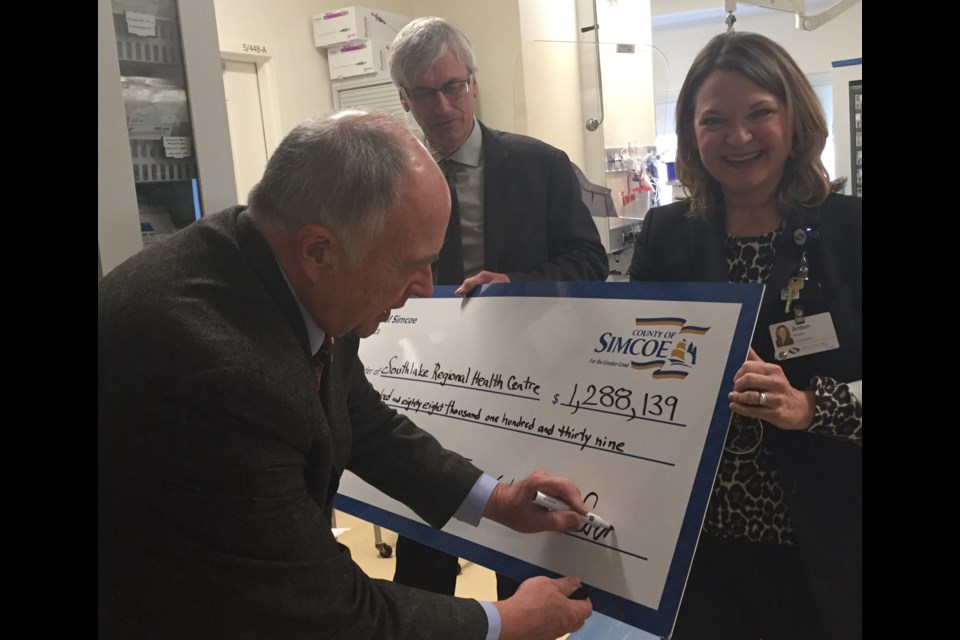A modest increase of 2.05 per cent for hospitals in the 2019 provincial budget is being welcomed at Southlake Regional Health Centre.
“We are pleased to see additional funding for hospitals. We do not yet have details about what this will mean for Southlake specifically,” said Southlake Regional Health Centre president and CEO Arden Krystal.
“We are excited by the vision for transforming the health care system announced by Minister (Christine) Elliott in February,” Krystal added. “These much needed reforms will give us the ability to better partner with organizations in the community to provide patients and families with more connected care and seamless transitions across all parts of the health care system.”
The budget includes $267 million for home and community care, from personal support workers and assisted living, to therapy and nursing care, and more support for transitional care and partnerships.
“While engaging with patients and families for our strategic plan last year, we consistently heard that transitioning from one part of the health care system to another can be difficult,” Krystal said, noting that the Newmarket hospital has launched Southlake@home, providing an easier transition from hospital to home for patients, often elderly with complex needs, who require continuing care at home.
“This is an example of how better partnerships can have a real positive impact for patients and families.”
While hospital received an increase in funding — still below the rate of inflation – the province is promising to cut $1 billion in health care costs over the next three years.
The Ford government expects to save $350 million through its new health superagency, Ontario Health — amalgamating 20 existing organizations that include Local Health Integration Networks and Cancer Care Ontario; and another $200 million through unspecified “optimizing workforce productivity.”
There are also plans to cut $200 million from the public health budget, which could mean a "huge, disruptive change" for the public health units and their community partners, said Dr. Charles Gardner, medical officer of health with the Simcoe Muskoka District Health Unit.
There are currently 35 public health units in Ontario, each governed by a Board of Health, that provide front-line services such as vaccinations, inspections of public kitchens in hospitals, universities and schools, monitoring of water quality and food safety, and tracking of communicable diseases.
The budget proposes “streamlining” the system to create 10 regional public health entities and 10 new regional Boards of Health “with a common governance model” by 2020-21. It also calls for a reduction in the number of laboratories, promising to “improve public health programs and back-office efficiency and sustainability while providing consistent high-quality services.”
Gardner is questioning how the Boards of Health could continue to fulfil their mandate to prevent disease and protect and promote health, especially with less funding and fewer laboratories.
Public health unit are involved in childhood immunization programs, drinking water protection, inspection of small drinking water systems, monitoring of bacterial levels at beaches and in wells, nutrition programs and food safety— inspecting all kitchens that serve the public, providing food handler training, and tracking and dealing withoutbreaks of food-borne disease.
As well, public health works to prevent “vector-borne diseases, like Lyme disease,” said Dr. Gardner, as well as West Nile Virus and rabies — monitoring and mapping the location of cases and providing that information to family physicians.
Currently, the province funds 75 per cent of the cost of public health, which comes to $743 million each year, “so a $200-million reduction is quite substantial,” said Gardner. “That will indeed stretch us.”
He was also concerned about the proposed closures and cuts to laboratories, “which we depend on for our communicable disease response, and water-borne illness testing.”
The medical officer of health had praise for the province’s new dental plan for low-income seniors, a $90-million commitment over five years.
But he urged the province to think before making the planned cuts to public health.
“Public health is excellent value for the money. It gives a tremendous return on investment,” improving health outcomes, and reducing deaths and health costs, he said.
As an example, he noted that Ontario’s $500-million campaign to promote smoking cessation saved the province an estimated $5 billion in tobacco-related death, disease and health care costs.
Gardner was sympathetic to the province’s desire for greater efficiencies, but he questioned whether larger super-boards would achieve that goal.
“It remains to be seen what that will do in terms of local access,” he said, and connections to municipalities.
Municipalities currently play a big role in public health, through their policies, infrastructure and bylaws, and the health boards work with those governments on everything from emergency preparedness and tobacco control, to social housing.
Whether those ties can be maintained, especially if municipalities are asked to pick up a bigger share of public health costs, remains to be seen, he said.
Other areas of concern includes the budget's move to increase sales of beer and wine in local corner stores, an earlier start (9 a.m.) for alcohol sales in restaurants, use of alcohol in public spaces, and permission for “tailgate parties” in advance of sports games.
“Our board of health has long advocated for alcohol controls,” said Gardner. “Liberalizing access and use of alcohol works against that.”
He warned of increases in impaired driving, criminality and even deaths, suggesting, “any increased revenues from sales would be more than offset by those.”
